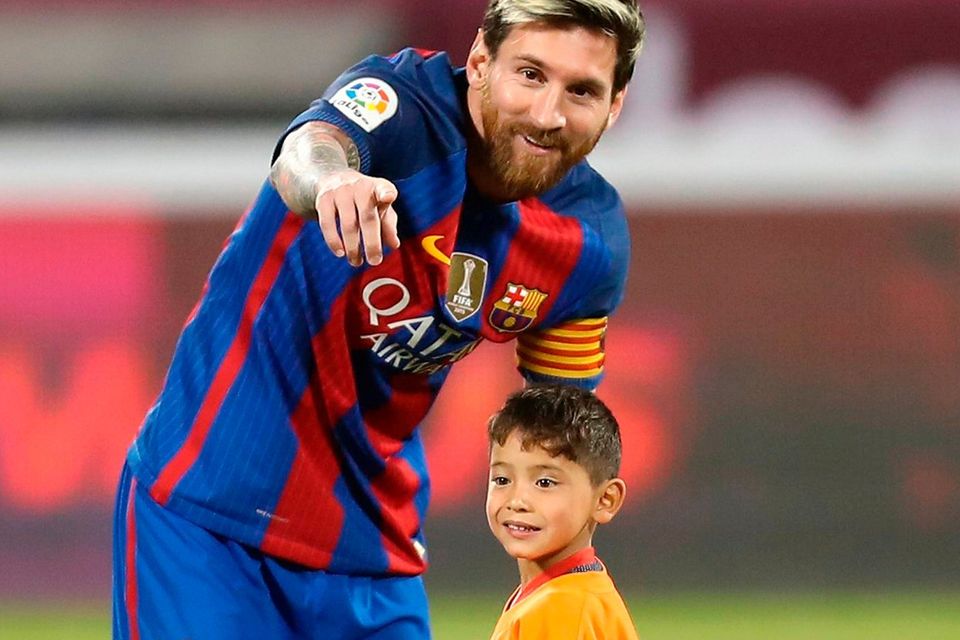Messi and Murtaza's photo op can't hide Qatar's brutal truth
Barcelona’s Lionel Messi meeting Murtaza Ahmadi in Doha on Tuesday. Photo: Karim Jaafar/AFP/Getty Images
You could hardly fail to see the footage on Tuesday evening of six-year-old Afghan Murtaza Ahmadi hugging the waist of Lionel Messi and generally being reluctant to leave the presence of the great man when his duties as mascot for Barcelona's midweek friendly ended.
This was, after all, the little boy who had once worn an Argentina No 10 shirt made from a stripy plastic carrier bag with Messi's name and number written in pen on the back, and whose picture had made him an internet sensation. He was the boy with nothing, playing football in the snow, who wanted so much to be like the man who has everything.
From the moment Murtaza's pictures went viral, a meeting between him and Messi felt strangely inevitable in this connected world in which we live, where saving 10,000 Syrian refugees is beyond the wit of First World nations but setting up some face-time for one with a superstar footballer can be done.
Good on Murtaza, who will head back to his new home in Pakistan with the best set of selfies in town and a nod in the direction of the United Nations' refugee agency, UNHCR, who made it all happen. Where it took place is the point that this story of childhood dreams gets a bit more complicated.
Influence
It was in Doha, Qatar, and you did not need to be a Messi superfan to know why the Argentinian and his Barcelona team-mates were playing a friendly there against local side Al Ahli, just five days before they meet Espanyol in the league. Luis Enrique replaced his star forward line of Messi, Neymar and Luis Suarez after 32 minutes - by which time all of them had scored.
Only days earlier Barcelona had been asked by human rights charity Amnesty International to examine their relationship with Qatar, after the country's reform of labour laws for its 2.1 million migrant workers failed to offer necessary rights. All Amnesty requested of Barcelona, who are in the final year of their €140m shirt sponsorship deal with Qatar Airways, was to tell their hosts they wished to play in a "human rights-friendly environment".
It had been hoped that new Qatari labour reforms this week would introduce rights for migrant workers employed in building the stadiums and infrastructure for the 2022 World Cup finals.
Instead, the Qatar government introduced a new system that Amnesty described as "meagre" in its effective change, and which might even have made migrant workers in the Gulf state more vulnerable to exploitation.
As of Tuesday, migrant workers in Qatar still require their employers' permission to change their jobs and can face criminal charges for absconding during a contract. They still need exit visas to leave, which can be blocked by the government. Amnesty says employers can now keep workers' passports, which was previously illegal.
There are Afghan migrant workers in Qatar, although only a few thousand according to recent estimates and much smaller in number than the major expat communities of Indians (approximately 640,000), Nepalis (430,000) and Pakistanis (300,000). Were an adult relative of Murtaza to pursue employment in the vast Qatar 2022 building programme that is expected to peak in the next year, they would certainly have an experience very different to those migrants from developed nations.
Very few migrant workers are able to bring their families to Qatar because of the rules governing immigration, which dictate that only those in certain professions earning at least 10,000 Qatari riyals (€2,575) a month, or 7,000 QR (€1,800) with employee provided housing, can bring in relatives.
Given that the average monthly wage for a migrant worker is 1,200 QR (€310), there will have been very few children of migrant workers in the Al-Gharafa Stadium on Tuesday to watch Messi.
Qatar claims that only 10,000 migrant workers are employed on stadium building for 2022, but the reality is that many more are working on the tournament's infrastructure - railways, hotels and the Lusail City venue for the opening ceremony and final.
Relocated
The story does not have an entirely happy ending for Murtaza, who is now a refugee, because his family judged they were no longer safe in Afghanistan, following their son's new-found fame, and have relocated to Quetta, in Pakistan.
Whether Barca took Amnesty's advice before returning home is unknown, although the Qatar association has done them no harm. The club's new four-year shirt sponsorship deal with Japanese internet retailer Rakuten is worth €225m.
As for the Qatar government, it has "fundamentally rejected" the criticism from Amnesty of its new labour laws and says that the new measures will "ensure workers' rights are respected".
When Murtaza found it difficult to leave Messi's side, the little boy was picked up by the Qatari referee, the Fifa-listed Fahad Al-Marri, who carried him to the touchline and gave him a kiss on the hand as he did so.
It was an instinctive, tender moment worth a million dollars of expensive PR consultants, and presumably just the image Qatar would like to convey to the world.
Yet, you would do well to ask yourself how the millions of other migrants from countries such as Afghanistan continue to be treated when they reach Qatar, and certainly it would be very different to this little boy's transformative experience. (© Daily Telegraph, London)















